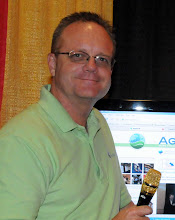Taking the Pulse of Biotechnology
A big thanks to Communications Committee Co-Chair, Rhett Hawkins, Osborn & Barr (and Tammy Humm Donelson) for submitting a great write-up for our last meeting. In case you missed it here's what happened:
Dr. Roger Beachy, President of the Danforth Plant Science Center, internationally known plant scientist, addressed the St. Louis chapter of the Nation Agri-Marketing Association and the St. Louis Agri-Business Club regarding the opportunities and challenges in ag biotech.
The Impact of Ag and Biotech on the St. Louis Region and Missouri
With the Danforth Plant Science Center, Missouri Botanical Garden and Washington University at its hub, ag biotech impacts the St. Louis economy in a major way with ag contributing 12 percent of the regional economic value and involving 20 percent of the regional workforce (source: Regional Commerce & Growth Association). As a biotech think tank, St. Louis is home to 450 biotech PHDs working for Monsanto, Bunge, Pfizer, Solea, Chlorogen, Orion, Tyco Healthcare, World Ag Forum, Cargill and the Danforth Center. Currently, such organizations are working to define Missouri’s niche in crop-based fuels such as bioethanol and biodiesel and crop and non-crop plants as sources of a variety of bio-based materials.
Global Competition to Rise
On a broader scale, the United States faces increasing global competition to stay at the leading edge. Beachy warned, “For the U.S. to stay competitive, we must continue innovation in research and development in plant sciences and create a conducive regulatory environment. The open import/export market serves the U.S. only as long as we have more to offer than other nations” With regulatory costs for new product introduction approximately $50 million, research businesses in areas that discourage development will be bought and move to growth-friendly climates.
The Outlook for the Future
Beachy predicts that partnerships will be necessary to stay competitive in the future with joint research conducted in public and private sector labs. The science, safety and benefits need to be clearly communicated to the regulatory channels as well as the marketplace. Beachy claims, “There is so much opportunity in diet enhancement and enrichment. Folic acid and zinc can be increased by 60 to 70 percent [in some foods]. Without pills, we can provide a better nutritional balance. There is no doubt that we will be importing these foods from China in 20 years if we don’t develop them ourselves now.”
At the end of his presentation, Dr. Roger Beachy was presented with the 2004 St. Louis Agri-Business Leader of the Year Award.
Dr. Roger Beachy, President of the Danforth Plant Science Center, internationally known plant scientist, addressed the St. Louis chapter of the Nation Agri-Marketing Association and the St. Louis Agri-Business Club regarding the opportunities and challenges in ag biotech.
The Impact of Ag and Biotech on the St. Louis Region and Missouri
With the Danforth Plant Science Center, Missouri Botanical Garden and Washington University at its hub, ag biotech impacts the St. Louis economy in a major way with ag contributing 12 percent of the regional economic value and involving 20 percent of the regional workforce (source: Regional Commerce & Growth Association). As a biotech think tank, St. Louis is home to 450 biotech PHDs working for Monsanto, Bunge, Pfizer, Solea, Chlorogen, Orion, Tyco Healthcare, World Ag Forum, Cargill and the Danforth Center. Currently, such organizations are working to define Missouri’s niche in crop-based fuels such as bioethanol and biodiesel and crop and non-crop plants as sources of a variety of bio-based materials.
Global Competition to Rise
On a broader scale, the United States faces increasing global competition to stay at the leading edge. Beachy warned, “For the U.S. to stay competitive, we must continue innovation in research and development in plant sciences and create a conducive regulatory environment. The open import/export market serves the U.S. only as long as we have more to offer than other nations” With regulatory costs for new product introduction approximately $50 million, research businesses in areas that discourage development will be bought and move to growth-friendly climates.
The Outlook for the Future
Beachy predicts that partnerships will be necessary to stay competitive in the future with joint research conducted in public and private sector labs. The science, safety and benefits need to be clearly communicated to the regulatory channels as well as the marketplace. Beachy claims, “There is so much opportunity in diet enhancement and enrichment. Folic acid and zinc can be increased by 60 to 70 percent [in some foods]. Without pills, we can provide a better nutritional balance. There is no doubt that we will be importing these foods from China in 20 years if we don’t develop them ourselves now.”
At the end of his presentation, Dr. Roger Beachy was presented with the 2004 St. Louis Agri-Business Leader of the Year Award.


0 Comments:
Post a Comment
<< Home